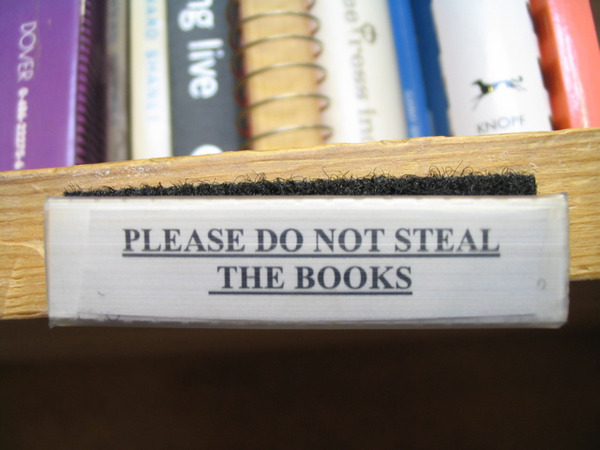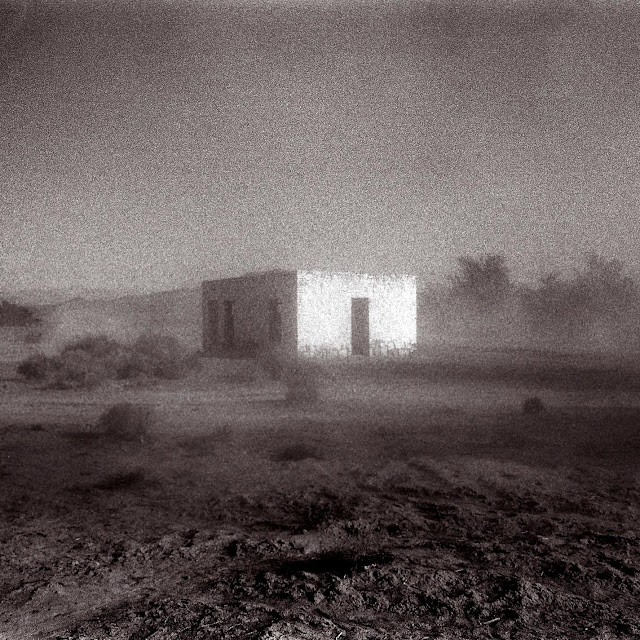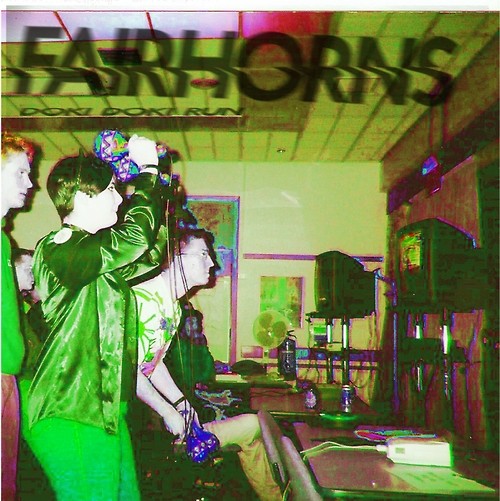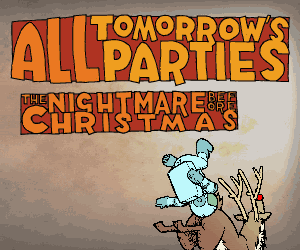
"Like most things I do, while I'm setting them up I have absolutely no idea what I'm getting into. So when I started immortalising this record I would say: 'OK, drums! Let's record some drums now'", Zammuto's voice giving in to a jejune chirrup of laughter. Never one to do things by halves, nor indeed by any fraction yet known to the human mind Nick Zammuto is still learning. Learning how to record the prerequisite elements of most functional "bands"; learning to think outside the box; learning to become the focal point he never even so much as hinted at becoming during his time in a band that has now definitively come to its natural conclusion. The End of the Books was, in Zammuto's mind, nigh for a conceivably protracted period of time and yet he and cellist/ onetime companion Paul de Jong continued to scribe new chapters. Now, following what felt like an entirely untimely demise from an external perspective, whilst the Books may be slammed shut Nick remains as thirsty and focussed as ever and although here in London having performed an altogether new composition for the Bang on a Can All-Stars at the Barbican Centre – in the dense concrete bowels of which we're sat – he's insistent he'll soon return on his own merit.
However he concedes to losing his way somewhat following what, although only skirted around, sounds like a rather inimical breakup: "This record was like a do-or-die situation for me. I kinda felt like: 'What do I do now?' And I felt as though maybe I should quit because, you know, it's so hard on my family to do this but my wife and friends encouraged me 100%. To just go for it; to go and do something new. Or at least give it a shot..."
Although not entirely new – the rampaging bass lines of The Way Out slink through the ominous mechanical thunder of F U C-3PO; sample interlude Crabbing recalls the Books' heavily documented collagist approach; the self-professed 'Grammar Stickler' swoons through Auto-Tune on Too Late To Topologize (below), a searing denunciation of that dastardly Timbaland track perhaps – in scrapping the scraps of sound and opting to gallivant toward this unquantified "something new", with a full band in tow (albeit one that includes brother Mikey, the Books' touring multi-instrumentalist Gene Back and drummer Sean Dixon, "a real scientist on the drums"), Zammuto has galvanised his presence to forge a comprehensible future. And although in many respects Zammuto represents an acutely linear continuation of his fascinating past, this self-titled debut feels incontrovertibly offbeat whilst remarkably pristine.
However to delve into the unknown, it feels as though the painfulness of these gaping wounds past must be ascertained in order that they be closed up and closure be achieved. "the Books are over. Period. I can't foresee anything more happening between us. I kinda wanted to get that sort of announcement out of the way so that I wouldn't have to keep repeating myself over and over again. I don't mind talking about it 'cause I feel as though I'm now over it to a large degree. It still makes me kinda mad and I'm not gonna delve into the details of that but suffice to say, the project had run its course. And I loved that project." However philosophical as Zammuto may be – and you sense him to be a being finely attuned to the sporadic rhythms and erratic tickings of the universe – positivity stems from the detrimental predicament within which he was bookmarked: "Just being out of the bad situation that merely being in the Books unfortunately became started to inspire me and to work with a group of people who were, like, totally in – no questions – helped with that."
Resultantly Nick's preferred tense throughout our colloquy is that of the present, the omnipresence of the adverb "now" within this transcript placing stern impetus on actuality. And with the eponymous record already readied for avid guzzling, Zammuto's intelligent attentions are forcibly turned to the live show and the powers he may now wield through such a medium. Although he may be wondrously deferential over the course of our fleeting crossing of coordinates, he now brazenly confirms: "The live show's all set, and it just rocks." Cocksure affirmation it may be, although this erudite type is still some way off becoming some lovingly loathed (or perhaps loathably loved) swaying and slurring focal point: "I'm kinda off to the side, facing the drummer so it's not set up like a kinda frontman situation. It's much more of an 'ensemble' than anything, for lack of a better word... I've tried to give equal weight to everything. It had to be a different approach, and working with live vocal effects has been another huge inspiration on this project: all the vocal effects that are on the record can be reproduced live. Now that the technology available has reached that sort of a point, that's exactly what I'm aspiring to do." For anyone to have caught the Books within a dimly lit arts centre or perhaps an ever more sunless Alexandra Palace last summer, the reluctance to conform to such comportment may have been palpable and Zammuto confesses that it was truly and utterly down to "a lack of confidence within the Books; I didn't want people looking at me while I was onstage." And although barely visible through dense shade at I'll Be Your Mirror, he's hoping to evade such elaborate setting in favour of intimate cesspits drenched in perspiration dripping globular from above next time around.
Although it's not merely a change in venue that he craves as another inexorable parallel between then and "now" surfaces from the waters of thought: "The biggest difference for me was that I didn't wanna go onstage any more with backing tracks, to start becoming a meta band so I wanted to be backed up by a real band. I've been working on the live show continuously for this past year or so; it's been a full-time endeavour. And my players have definitely gone that extra mile in terms of making their parts stretch beyond that which I've sketched out for them in the record. I put everything I had into it and now I'm just crossing my fingers. You have to see it to fully understand it I guess..."
"Moreover with the Books we used to have wall-to-wall video and I'm not so interested in doing that again. That said, I still want to incorporate video into the show although it'll be employed much more sporadically, in short bursts and set pieces where the video provides the main focus. This time the predominant focus has to be on the band. It's a real band now and people love watching these players so I'm really trying to spread the attention around as much as possible." A newly afforded luxury, Zammuto's zeal for a greater sense of onstage human interaction is progressively transmogrified into another prominent point of conversation, and this transmutation is attributed to the educative process the record comes to represent: "I quickly realised you categorically cannot record drums with just two microphones and a preamp so I had to really up the ante in terms of production, especially as the Books was done mostly in a figurative box in that we would record all our own instruments. But that was pretty straight forward compared to recording a full band. For the first time in my life I basically became a gear-head and that was kinda inspiring in itself, leading to new directions right away. I feel as though it's really a step up from the Books in so many ways."
Irregardless of the interventions and contributions of other "players" and the inclusion of his sibling in the band's genetics, whilst "definitely not a side-project" Zammuto has inarguably never been quite so central with mind, body, soul and now name innately interwoven into the workings of this "band": "I thought long and hard about that [opting for the name Zammuto]; it wasn't a flippant nor egoistic decision. I hope... I came up with a lot of names although none of them stuck. Zammuto is such a... I dunno... It puts me beside Zappa in the stack which is worth a lot to me... It doesn't have any inherent meaning and it's sort of culturally ambiguous so it seemed to work." Quite abstruse a purported reality however has been that of his self-sufficient modus vivendi and although there is an indubitably, if inexplicably organic essence coursing through his every LP it is oft imbued with an almost industrial precision. Zammuto sluices down this hypothesis: "Well, we're maybe slightly more self-sufficient than your average human being but you know, I do own a car", this dichotomy between self-sufficiency and contemporary technological advances accentuated. Ever critical, he however disregards it as "a pretty deep irony" and one that he concedes to sensing daily, plaguing his morality.
Veering away from the villainy and general degeneracy of major labels and their enticing advances etc. however, Zammuto then constructs a verbal-cum-visual walk-through of his humble recording space: "I work in a tractor garage and from the outside it looks like a shack. That's where the record was recorded; mixed; mastered: 100%. From the exterior it really looks like a toolshed; a complete piece of crap! But when I moved in [moved in perhaps the operative verb construction here] I put a floor in it and so on as my wife had said: 'I'm sorry Nick but you can't work in the house any more; you're driving me crazy.' At that point I thought to fixing up that disused tractor garage so I insulated it; shoved a little heater out there so I could work any time: day, or night. It's just about big enough for the four of us to rehearse in but we use literally every square inch. You walk in from this kinda rural, bucolic situation (or at least during spring and summertime - it's like paradise out there. And in the winter it's like Arctic tundra - it's amazing) and inside it's kinda state of the art. On kinda like the second tier consumer level. But we do what we can with what we have."

Yet whilst listening to his often frenzied, uniquely intricate compositional work you often fear the possibility that Zammuto may go off on one or lose himself within his own constructions, never to return. Technology again intervenes: "It became really easy with modern home-production techniques to just kinda throw everything in there and just keep hold of it all. And when you're building it, it's unfeasibly fun to see what happens if you just keep adding to this big mushy thing and I feel like that aesthetic now is kinda giving way to, like, finding those lines of coherency that are just beautiful and clean; lines that go on to interact with other lines in seamless ways but in less frequent ways so it becomes like... um... easier to follow those threads so it's not so washy... um... it's got more clarity to it. And I definitely feel as though I'm moving in that direction rather than counting on that fallback of this everything and the kitchen sink approach..." He drifts off, lost in lines and the quite profound coherency just strung. "When you strip the songs down, they all work on their own for the most part. Jumbling and getting caught up and lost in translation was always within the Books as we aimed to capture this modern, real world feeling that everybody has. There's so much noise all of the time that the music kinda became both a reflection of that and, in a way, this therapeutic way of dealing with it. So we tried to take that noise and spin it into something that you can kinda live with in a way." Another quite "deep irony" at this point is that his registered words are here entangled with the unremitting hubbub of a great multitude of excitable children on inconceivably convergent school trips and the clatter of invisible trains.
His train of thought re-railed: "For the new record, the through-lines are more important as these are more conventional songs, you know? They're more kinda verse-chorus-bridge and I guess that's somewhat intentional. Whenever I start a record I think: "Man, I wish I could make Kid A, something that were so coherent and just utterly amazing. But... I'm not that guy; there are too many conflicting aesthetics going on within me and I just have to basically go for what I hear, which usually amounts to every track sounding as though it's coming in from its own world. I really immerse myself in one track at a time, to follow where it leads me rather than worrying so much about what the record is gonna sound like as one single entity and so if I work relentlessly on something for two or three weeks, it becomes a little subsection of my life as it were. At the end of the recording, the job's far from done as you have to start mixing, mastering, and putting the tracks in an order that can work. And that's always been difficult for me; it's physically painful for me to do that. So your mind works in an entirely different way to how it does while you're composing the tracks. It's like a zero-sum game or something: when the piece starts to push back at you, that's when you know you're done."
Such subversion is, in a way, a little manufactured or rather preconceived: in an era in which hyphens and prefixes determine style and sound, perpetuating the perpetual strive to stuff anything and everything 'unknown' into cavities of 'known', Zammuto rallies against such categorisation: "Not wanting to be pigeonholed has played a huge part in how I listen and create. And I never wanna repeat myself 'cause I feel as though each record should provide an opportunity to make the next one. So I don't feel as though there's an endpoint to this process but rather I'm working so that I can make the next record. But I don't want the next record to sound like this one so I need to give myself options and for that reason I don't want the world to shut it down and kinda compartmentalise it. And the Books had a good run in that way although by the end I definitely felt as though the doors were closing and that was extremely frustrating as I couldn't cultivate the band in a way to get us out of it. Adding a drummer would've been a key part to that but it just wasn't gonna happen."

And so what of London - this exponentially dilating metropolis millions call home? This hub of endless pigeonholes and innumerable pigeons that contrives to compartmentalise everything amidst consistently deafening commotion? Placidly, Zammuto contends: "I have three sons so it's actually quite a bit quieter for me while I'm on tour than when I'm at home!" and does so despite the howling reverberating about this cavernous space that assimilates the Barbican Centre to communal swimming pool. "Yeah, the noise at home is... erm... psychologically intense! It comes from children and they always want something from you." One may contend that they're therefore comparable to the discerning listener, hankering for Zammuto's every release and subsequently hanging off of it for substantial periods thereafter. However whilst the impact engendered by such a career may prove overwhelming; dumbfounding; or perhaps striking it's his sons that provide both enchantment and inspiration: "Having children is the best thing I've ever done; it's been truly inspiring creatively. You know, 'cause they're so pure and they look at the world with such fresh eyes that to be able to live vicariously through them has really awakened me to a much more simplistic perspective on life. If I were still a "hipster" living in Brooklyn, it wouldn't be like that."
And so just as Zammuto's children may have opened his eyes to previously unknown perspectives, his self-titled debut full-length may well do just that to your ears, unclogging when you thought there was but refined brilliance running between ground and steadily pulsating eardrum. "There's such greater richness to life after listening to certain pieces, and that's still what I'm after in a way. You gotta shoot for what you want: I've got no claim to 'coolness' so I can't play that game. I might as well take a different approach!" A contemporary maestro to have composed such pieces is revered post-classical composer Steve Reich and having recently encountered the ageing innovator he gleams: "His eyes still brimmed with this childlike wonder and it was amazing to see somebody maintain that." You sense Zammuto may be the record to propel Nick toward similar idolisation.
Dots & Dashes: "Sorry about the Books..."
Zammuto: "Yeah, me too. No seriously; I am."
As the proverbial spokes within zonked cellular phone creak to a halt, Zammuto lowers both head and voice to admit to The Way Out assuming a highly literal significance as it came to be his only escape from the oppressive confines of the Books. With its every page ripped from the here and now, if never from history and with every tie severed, he divulges the saddening truth that he can see no further possibility of working with de Jong. It's hardly the fairytale ending for one of the most unorthodox yet excellent bands of recent times although perhaps they were merely a prologue to history. For just as remnants from last night's show are few and far between – an AAA pass gummed to the back of his iPad; a long-since unattended wineglass stained a blooded shade of crimson stood at a nearby table – history swiftly heals, heaping shovelled present on the past and as our paths once again diverge beneath the claustrophobic covering of Beech Street he vehemently informs of The Greatest Autoharp Solo Of All Time, another piece composed for collaboration with the Bang on a Can All-Stars. Even though the Books may be slammed shut for the foreseeable, it'd seem as though this headstrong scribe has copious amounts of ink still in the pen, or stylus, or finger.
Zammuto is released April 30th via Temporary Residence Limited...
Zammuto is released April 30th via Temporary Residence Limited...























